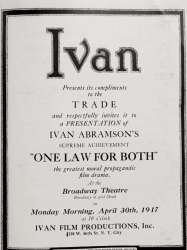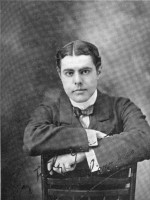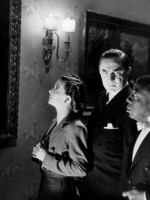Helen Arnold is a Actor American

Helen Prettyman Arnold was a silent film actress who appeared in motion pictures from 1916 - 1918.
Ms. Arnold was a member of the cast of the 1891 production of "Nerves" at the Lyceum Theatre in New York City.
Arnold played Viola Campbell in a 1916 production of The Witching Hour filmed in Flushing, New York. The film starred C. Aubrey Smith and Marie Shotwell. The movie was an adaptation of a play written by Augustus Thomas. One review described it as better than the stage drama which preceded it, while retaining the mood of strangeness. Arnold was said to be "an attractive Viola".
In June 1916, Arnold was among the winners of a Beauty and Brains contest held by Photoplay magazine.
Arnold made Two Men and a Woman (1917) with Christine Mayo and Rubye De Remer. The Ivan Film Productions, Inc., release is directed by William J. Humphrey.
She made two other Hollywood films, One Law For Both (1917) and
The Call of Her People (1917), which starred Ethel Barrymore. Her final film credit is for a role in the Italian film Il Doppio volto (1918).
Source : Wikidata
Helen Arnold

- Infos
- Photos
- Best films
- Family
- Characters
- Awards
Biography
CareerMs. Arnold was a member of the cast of the 1891 production of "Nerves" at the Lyceum Theatre in New York City.
Arnold played Viola Campbell in a 1916 production of The Witching Hour filmed in Flushing, New York. The film starred C. Aubrey Smith and Marie Shotwell. The movie was an adaptation of a play written by Augustus Thomas. One review described it as better than the stage drama which preceded it, while retaining the mood of strangeness. Arnold was said to be "an attractive Viola".
In June 1916, Arnold was among the winners of a Beauty and Brains contest held by Photoplay magazine.
Arnold made Two Men and a Woman (1917) with Christine Mayo and Rubye De Remer. The Ivan Film Productions, Inc., release is directed by William J. Humphrey.
She made two other Hollywood films, One Law For Both (1917) and
The Call of Her People (1917), which starred Ethel Barrymore. Her final film credit is for a role in the Italian film Il Doppio volto (1918).
Usually with
Filmography of Helen Arnold (1 films)
Actress

One Law for Both (1917)
, 1h20Directed by Ivan Abramson
Origin USA
Actors James W. Morrison, Leah Baird, Vincent Serrano, Paul Capellani, Helen Arnold, Pedro de Cordoba
Roles Magda
Elga Pulsaki (Rita Jolivet) and her brother Ossip (James W. Morrison) emigrate to the United States from Russia to escape persecution. Elga marries Norman Hutchinson (Vincent Serrano), but their marital bliss is torn asunder when Norman learns that Elga had had sex with a government official in Russia who had threatened her brother. Norman throws Elga out of the house, but Norman's sister reminds him that he did not suggest the same course of action for her when she realized her husband (Count de Fernac, played by Pedro de Cordoba) had previously fathered a child out of wedlock. Struck by cognitive dissonance—the unequal treatment of the sexes—Norman apologizes to Elga and they are reunited.
 Connection
Connection



